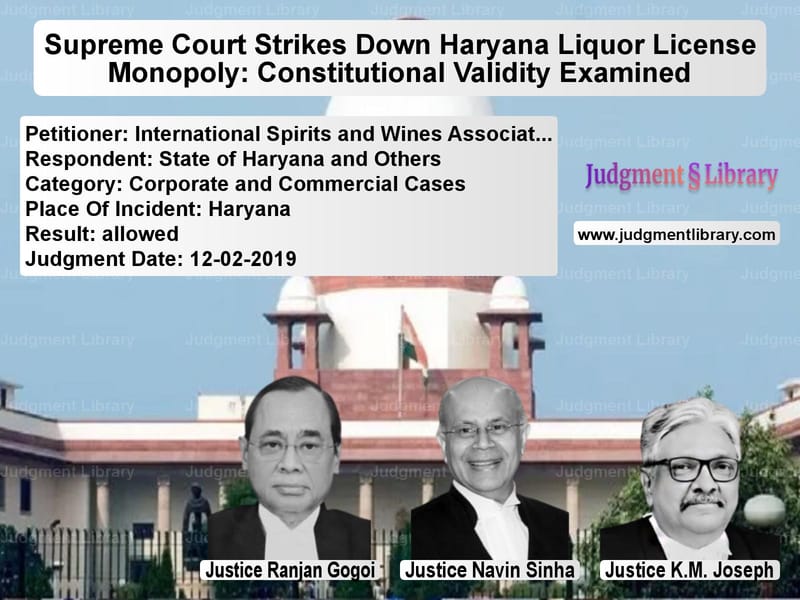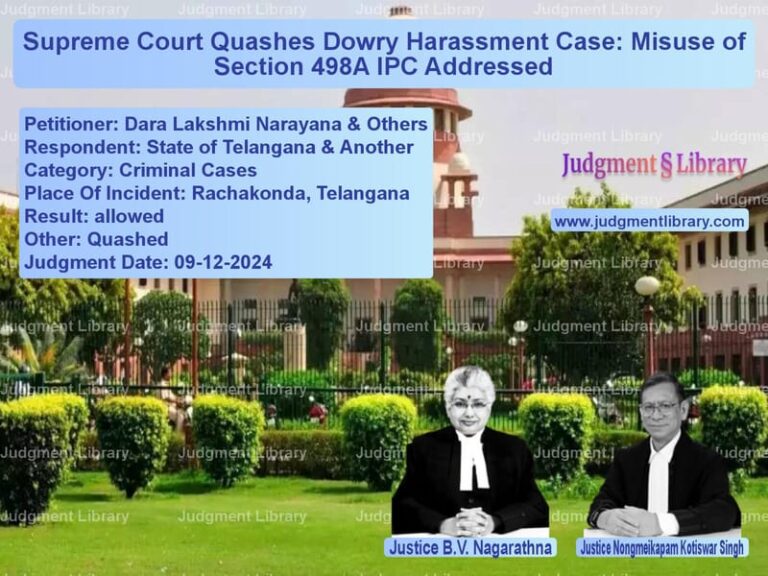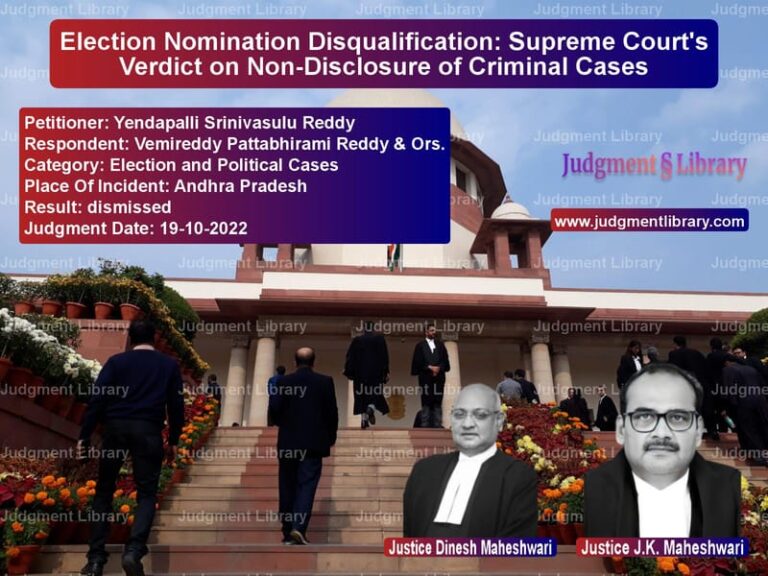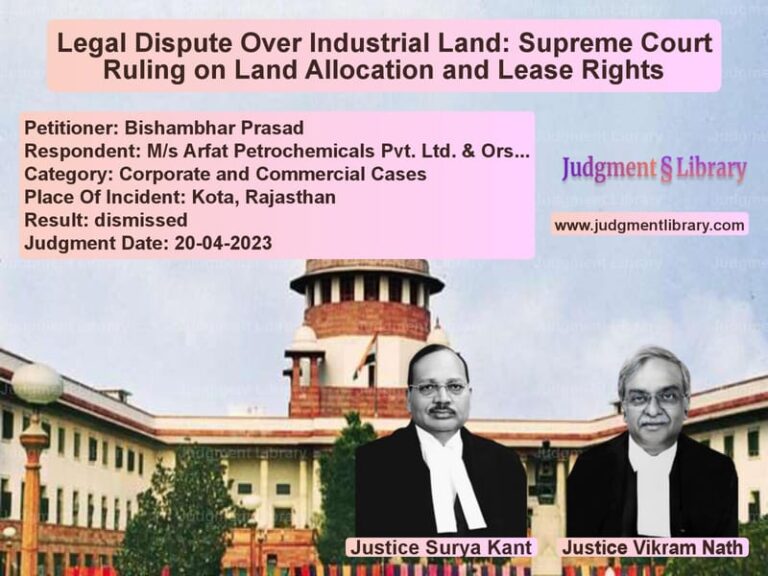Supreme Court Strikes Down Haryana Liquor License Monopoly: Constitutional Validity Examined
The case of International Spirits and Wines Association of India vs. State of Haryana is a landmark ruling where the Supreme Court examined the constitutional validity of an amendment made to the Haryana Liquor License Rules, 1970. The amendment introduced a single L-1BF liquor license for the entire state, effectively granting monopoly rights to a single entity. The case raised significant legal questions concerning the interpretation of Article 14 (Right to Equality) and Article 19(6) (Reasonable Restrictions on Trade) of the Indian Constitution.
Background of the Case
The dispute originated when the Haryana government amended Rule 24(i-eeee) of the Haryana Liquor License Rules, 1970, under the Punjab Excise Act, 1914. The amendment provided that a single license (L-1BF) would be granted for the entire state, effectively creating a private monopoly over the distribution and sale of imported foreign liquor.
The International Spirits and Wines Association of India (the petitioner) challenged the amendment on multiple grounds:
- It created an exclusive, monopolistic market structure that was unfair to other liquor traders.
- It violated Article 14 of the Constitution, as it arbitrarily discriminated against other potential license holders.
- It was ultra vires (beyond the powers) of the Punjab Excise Act, 1914, which governs liquor regulation in Haryana.
The petitioner sought the quashing of the amendment and a direction that the grant of L-1BF licenses be made more competitive and inclusive.
Key Legal Issues
The case presented several critical legal questions:
- Does the creation of a single liquor license for the entire state violate the principles of equality and fair competition?
- Was the Haryana government legally competent to introduce such a provision under the Punjab Excise Act, 1914?
- Does restricting liquor licenses to one entity infringe upon the right to trade and business under Article 19(1)(g) of the Constitution?
- Were the procedural and legislative mechanisms followed by the Haryana government valid?
Arguments by the Petitioner
The International Spirits and Wines Association of India, representing various liquor traders, argued:
- The Haryana government’s policy unfairly restricted competition and created a monopoly in the hands of one private entity.
- The amendment to Rule 24(i-eeee) was made through executive action without proper legislative backing.
- The Punjab Excise Act, 1914, does not authorize the government to introduce a single-license system for liquor distribution.
- The policy violated previous Supreme Court rulings, which emphasized that liquor trade policies must promote competition and transparency.
- By giving a single license for the entire state, the government granted unfair advantages to one entity while barring others from participating.
Arguments by the Respondent
The Haryana government and its excise authorities defended the policy, contending:
- The amendment was intended to curb illegal liquor trade and improve tax revenue collection.
- The single-license system enabled stricter oversight and compliance with excise regulations.
- The policy was implemented via a public e-auction, ensuring transparency in the selection process.
- The government has the discretion to regulate the liquor trade as it is a privilege and not a fundamental right.
- The amendment did not violate Article 14 as it was a reasonable classification with a legitimate state objective.
Supreme Court’s Observations
The Supreme Court analyzed the legislative competence of the Haryana government and the impact of the amendment on fair trade principles.
“The power to regulate the number of liquor licenses in a given area must be exercised within the framework of the parent statute. The amendment in question exceeds the permissible limits under the Punjab Excise Act, 1914.”
The Court noted that:
- While the state has the power to regulate the liquor trade, such regulation must not lead to monopolization.
- The Haryana government’s justification for the amendment was not backed by empirical data showing that a single-license system prevents illegal trade.
- The amendment effectively created a private monopoly in the liquor distribution business, contradicting the principles of fair competition.
- The rule was implemented through executive notification rather than proper legislative amendments, making it ultra vires.
Final Judgment
The Supreme Court ruled in favor of the petitioner:
- The amendment to Rule 24(i-eeee) was declared ultra vires the Punjab Excise Act, 1914.
- The single-license policy was struck down as unconstitutional.
- The Haryana government was directed to revise its liquor policy in a manner that ensures fair competition.
- The decision restored equal opportunity for liquor traders in Haryana.
Conclusion
This judgment serves as an important precedent in ensuring that liquor trade regulations do not create monopolies through executive action. The Supreme Court’s decision reinforces that any regulatory measures must align with legislative authority and constitutional principles of equality and fairness. The ruling is expected to have wide-ranging implications for liquor licensing policies in various states across India.
Petitioner Name: International Spirits and Wines Association of India.Respondent Name: State of Haryana and Others.Judgment By: Justice Ranjan Gogoi, Justice Navin Sinha, Justice K.M. Joseph.Place Of Incident: Haryana.Judgment Date: 12-02-2019.
Don’t miss out on the full details! Download the complete judgment in PDF format below and gain valuable insights instantly!
Download Judgment: International Spirit vs State of Haryana and Supreme Court of India Judgment Dated 12-02-2019.pdf
Direct Downlaod Judgment: Direct downlaod this Judgment
See all petitions in Company Law
See all petitions in Corporate Compliance
See all petitions in unfair trade practices
See all petitions in Judgment by Ranjan Gogoi
See all petitions in Judgment by Navin Sinha
See all petitions in Judgment by K.M. Joseph
See all petitions in allowed
See all petitions in supreme court of India judgments February 2019
See all petitions in 2019 judgments
See all posts in Corporate and Commercial Cases Category
See all allowed petitions in Corporate and Commercial Cases Category
See all Dismissed petitions in Corporate and Commercial Cases Category
See all partially allowed petitions in Corporate and Commercial Cases Category







